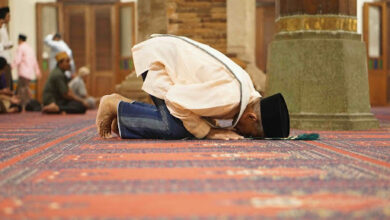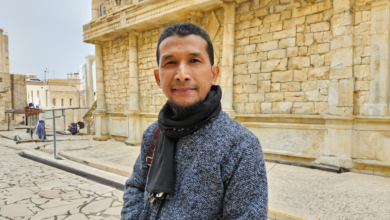
Reluctant to be grateful, the beginning of denying the existence of God
 Oleh Ustadz H. Sukron Makmun, Lc., LL.M.
Oleh Ustadz H. Sukron Makmun, Lc., LL.M.
Presented at the Online Study on Sunday, December 6, 2020.
The majority of scholars agree that it is illegal to pray someone without reading al-Fatihah, "La shalata liman lam yaqra 'bi fatihati al-Kitab". Rasulullah Saw also once said to his friend, "Do you want me to show you the treasury of the Koran (something important)? Then the treasure turned out to be the letter al-Fatihah (ummul-Kitab).
But in today's era, because we often read Fatihah without being based on knowledge, eventually our reading - even in prayer - begins to lose its spirit. Kind of not sacred anymore, because it has become a routine. Religious terms are gradually being displaced by terms coined by modern society.
In fact, the existing lafazhs are Surat al-Fatihah, that includes standard verses, which use kalam news (not insha'i). When we read this surah, it should be lived in, so that the contents of the verses seep deep into the heart.
In a hadith Qudsi it is said that,
قال الله تعالى: قسمت الصلاة بيني وبين عبدي نصفين, ولعبدي ما سأل, فإذا قال العبد: {الحمد لله رب العالمين}, قال الله تعالى: حمدني عبدي, وإذا قال: {الرحمن الرحيم}, قال الله تعالى: أثنى علي عبدي, وإذا قال: {مالك يوم الدين}, قال: مجدني عبدي - وقال مرة فوض إلي عبدي - فإذا قال: {إياك نعبد وإياك نستعين} قال: هذا بيني وبين عبدي, ولعبدي ما سأل, فإذا قال: {اهدنا الصراط المستقيم صراط الذين أنعمت عليهم غَيْرِ الْمَغْضُوبِ عَلَيْهِمْ وَلَا الضَّالِّينَ} قَالَ: هَذَا لِعَبْدِي وَلِعَبْدِي مَا سَأَل
Allah says, “I divide the prayer between Myself and My servant in two. For my servant what he asks. When my servant reads, "Alhamdulillahi rabbil 'alamin." Allah Ta'ala said, "My servants praise Me." When my servant reads, "Ar-rahmanir Rahiim." Allah Ta'ala said, "My servant repeats the praise for Me." When my servant reads, "Maaliki yaumid deen." Allah said, "My servant exalts me." In another narration, Allah says, "My servant has handed over his affairs to Me." When my servant reads, "Iyyaka na'budu wa iyyaaka nasta'in." Allah Ta'ala said, "This is between Me and My servant, and for My servant according to what he asks." When my servant reads, “Ihdinas-Shirathal mustaqiim… .dst. until the end of the letter. " Allah Ta'ala said, "It belongs to My servant and to My servant according to what he asked for."
Alhamdulillah Rabbi al-Alamin is a standard word in Islam
So far, people associate favors to the average because of money, position, beautiful women, facilities, influence, and so on. Alhamdulillah Rabbi al-Alamin is a standard word in Islam. By reading "Alhamdulillahi" all praise to Allah, it means that we are trying, how to eliminate, destroy all of them: influence, money, position. So, we finally believe that all the blessings that exist are only from Allah and should be reserved for Allah alone.
Allah is flattered when we say "Alhamdulillah". Hamidani 'servant, said Allah. Alhamdulillah means:
- Eliminating shirk (no strength, no favor apart from Allah)
- There is no external joy because of Allah
- Strengthening our tauhid
Alhamdulillah, we must make it as spirit-Islam. By saying that lafazh, it is very clear that the mentality of a servant is that to go to Allah is flattering and praising.
Alhamdulillah is a sentence that is repeated most often in the Koran, not istighfar, because when talking about forgiveness means that it involves creatures. WL, not hamid-tu allah, using standard language, legal / basic / constitutional language. Because if you use"Hamidtu" for example, then how seriously man is grateful, how much man is grateful for the gifts of Allah?
There is no "Alhamdulillah" that is leaned against mutakallim, because here the ultimate goal of all servitude and every flattery we give is Allah. And only Allah is the one who deserves it.
ا ا الله
Humans cannot flatter, position Allah appropriately and proportionally.
Verses / surahs that are standard in the Koran, such as the chair verse, qulhuwallahu ahad, al-Fatihah, all have nothing to do with creatures.
Unlike those related to forgiveness, istighfar. There is something to do with humans, there is hazzhun-Nafsi there.
In the world of Sufism, there was a story, there was a servant who went to hell. But those concerned still praise Allah, with Yes Mannan, Yes Hannan.
When asked, why do you keep praising me, while in hell? The answer, I have nothing to do with hell. I do not care. As a servant, my job is only to praise. Praising has nothing to do with going to hell.
This is the same as 2 × 2 remains 4. Whether we are rewarded or not, common sense still says 2 × 2 is 4.
It means that the person is already in the state of 'Isyq' (passionate love / longing), so that he is in a state of mortal', reach for the station Hudhur.
Iyyaka na'budu wa iyyaka nasta'in. There it is discussed the interests of humans, asking for help. Here it starts to get complicated, so then it closes with
اهدنا الصراط المستقيم… صراط الذين انعمت عليهم
What is the straight path? There it is explained, is the path followed by those who get pleasure (a form willed by Allah). We don't need to interpret things. For more details, we look at the next verse, which is the antithesis of the straight path, namely
المغضوب ليهم لا الضالين
The prohibition for everyone who is fearful is "whatever God is displeasing to". Then, what is the closest to the quality that God is least pleased with? Namely, "cannot be grateful". Even though you have to go back and forth for the Hajj 50 times, if you are not grateful, it will be very difficult for you to enter heaven. Because being ungrateful is the beginning of people denying the existence of Allah.
Hence, in the Koran, the sins of those who are adultery or even kill, are not as extreme as those of an ungrateful person. The verse that explains the sin of adultery and killing, there are exceptions, except for those who repent. If you repent and improve yourself, you will be forgiven.
والذين لا يدعون مع الله إلها آخر ولا يقتلون النفس التي حرم الله إلا بالحق ولا يزنون ومن يفعل ذلك يلق أثاما يضاعف له العذاب يوم القيامة ويخلد فيه مهانا إلا من تاب وآمن وعمل عملا صالحا فأولئك يبدل الله سيئاتهم حسنات وكان الله غفورا رحيما ومن تاب وعمل صالحا فَإِنَّهُ يَتُوبُ إِلَى اللَّهِ مَتَابًا (الفرقان: 68-71)
Unlike if humans do not want to be grateful, then the excruciating torment is the reward (QS. Ibrahim: 7). Also in the hadith it is stated, "Whoever is not grateful for My blessings and is not patient with it reinforcements (Test) -Me then seek God besides myself, and let it come out of (this) earth. " [DDHK News]



